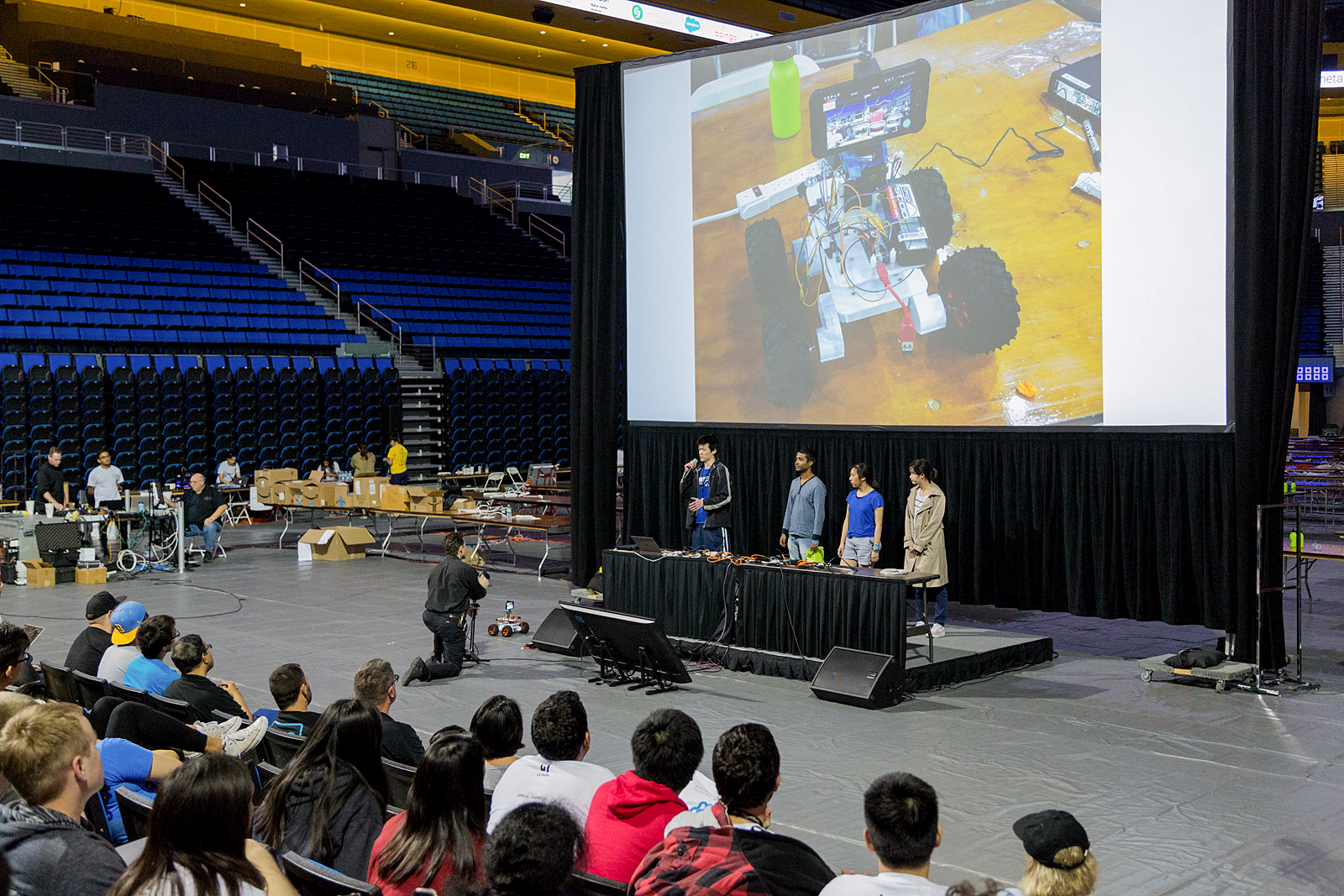Pauley Pavilion once again became host to littered sleeping bags and empty energy drinks as hundreds of students from across the country and Canada participated in Southern California’s premier hackathon. Originally founded in 2013 by two UCLA students and hosted in Santa Monica, the inaugural LA Hacks was only 24 hours long and drew roughly 150 students. Now, officially partnered with Major League Hacking, the student hackathon league, LA Hacks was able to bring over 700 students to the 36-hour-long marathon.
The event kicked off at 6 p.m. on April 25 with an opening ceremony that introduced the hackers to the year’s event, special guests and sponsors. Speakers came from across the tech industry, including Google and Roblox. Michael Yan, co-founder of the startup Simplify, also gave a speech on entrepreneurship in the tech industry and found a receptive crowd. The real highlight, however, was a fireside chat with billionaire, CEO and co-founder of Snapchat, Evan Spiegel. Spiegel had also previously attended the hackathon in 2014 and reflected on how his life and the tech industry have changed over the years since then.
At 7 p.m., the hacking started. The court of Pauley soon became the site of a different kind of competition, where teams of up to four used laptops instead of basketballs to play. The first step was deciding what to create. Multiple project tracks were offered to competitors, with AI-related projects being a recurring theme and roughly $90,000 worth of prizes to compete for.
Sponsors, like Snapchat, played a key role in this. They provided additional tracks and challenges for participants to choose from and offered prizes for the first-, second- and third-place winners of each challenge. Google offered a $2,000 cash prize to the team that developed the best application of its latest Gemini AI model, while Snapchat challenged engineers to discover and create innovative uses for its augmented reality glasses, Spectacles. Snapchat also rewarded engineers with cash prizes and a pair of the glasses.
Jesse McCulloch, the Spectacles Community Manager at Snapchat, led a workshop on Friday night to help introduce augmented reality to the hackers. While the hackers already benefit from cash prizes, Jesse said the event also allows for students to be introduced to Snapchat’s student accelerator program, where students can get training and support in starting a new business. He concluded by saying that the sponsorship creates a “symbiotic relationship” with the students, as Snapchat can also benefit from the ideas and projects students present at the end of the 36 hours.
For the next day and a half, the students worked on completing their projects. Breakfast, lunch and dinner were provided, and events were organized, ranging from sponsor workshops to a poker tournament and a lettuce-eating contest. Hacking officially ended on April 27 at 7 a.m. in the morning. Those who submitted a project were required to include short video demos of their work to be judged.
Kylie Bach, marketing director of LA Hacks, said the organization recruits “technical industry professionals from companies like Google, Microsoft and OpenAI” to judge the projects. The projects were scored based on originality, usefulness, practicality and how closely they related to the track they were submitted to. First overall prize went to Alto, a project leveraging Google’s Gemini AI to help mobile developers quickly find, fix and deploy bug fixes.
Chiemeka Kalu, a fourth-year linguistics and computer science student at UCLA, also used Gemini with his team to develop an online EcoStore meant to help people shop more eco-friendly products and alternatives that shoppers look for online. While his team didn’t take home any major awards, he still reflected positively on his experience. “Hackathons are really cool because they force you to become creative. Projects that would normally take a month to complete, you are forced to do in 36 hours,” he said. The Kalu and his team were still able to land a few hundred dollars worth of Gemini API credits.
The hackathon wound down with a closing ceremony Sunday afternoon. Laptops were shut, sleeping bags were packed and students began to make their way out of the stadium. What originally started over in 2013 with just 150 students in Santa Monica has now become an exciting marathon, hosting hundreds to thousands of participating students every year. With new developments in technology, LA Hacks will always be a place where innovation and careers can be sparked through friendly competition. The hackathon will continue to be hosted at Pauley Pavilion, and as the world moves forward in innovation, it will be fascinating to see what future hackathons will hold.
—
Featured Image via Daily Bruin Archives

